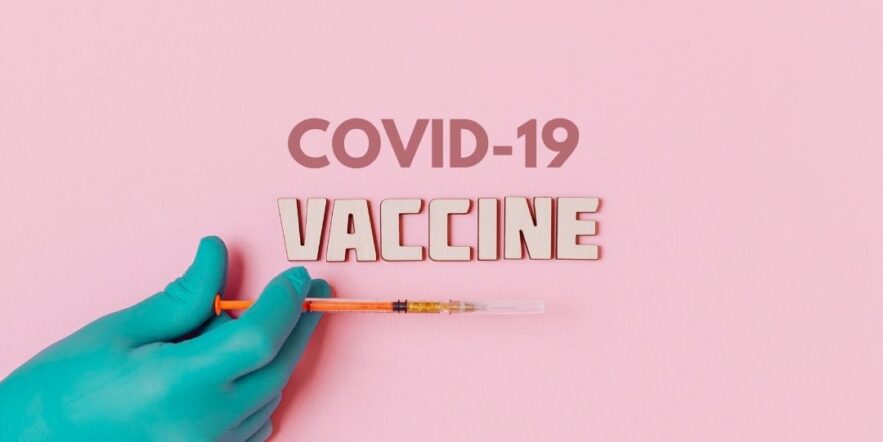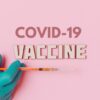When the first COVID-19 vaccination was authorized back in December 2020, millions of eligible people lined up at vaccination sites, sometimes for hours, waiting for protection from the disease. Age was one of the main factors, with the country’s oldest residents up first. Week after week, the age for eligibility lowered until it reached 16 for Moderna’s shot and 18 for Pfizer’s.
Before, children under the age of either 16 (for Moderna) or 18 (for Pfizer) could be vaccinated, the shots needed to undergo additional testing to evaluate the appropriate doses, side effects and efficacy in younger individuals. For children ages 12 to 15 years old, the Food and Drug Administration (FDA) authorized Pfizer’s vaccine in May 2021, and for those ages 5 to12 years old, the agency okayed it in October 2021. Authorizations for Moderna’s vaccine in these age groups were held back as regulators investigated the heightened risk of heart inflammation myocarditis in adolescent patients.
As new viral variants and surprising results complicated trials, the timeline to authorize vaccines for kids under 5 got pushed back to provide time to collect and analyze more data.
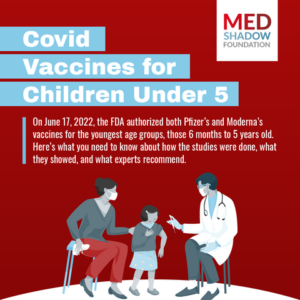
Finally, on June 17, 2022, the FDA authorized both Pfizer and Moderna’s vaccines for the youngest age groups, those 6 months to 5 years old. Here’s what you need to know about how the studies were done, what they showed and what experts recommend.
How Dangerous Is COVID-19 for These Young Kids?
Throughout the pandemic, scientists have often stated that the disease is less severe in children. Fewer than 500 children from 0 to 4 years old have died from the disease in the US, but that still makes it one of the leading causes of death in children. Tina Tan, MD, an infectious disease pediatrician at Northwestern University, told SciLine, that death isn’t the only severe outcome of COVID-19, “The most important factor that parents need to be aware of is that children can become quite ill with COVID-19,” she says. They can develop the condition multisystem inflammatory syndrome in children (MIS-C), long Covid or diabetes, as a result of the disease.
How Did the Studies Demonstrate Efficacy of the Vaccines for Kids?
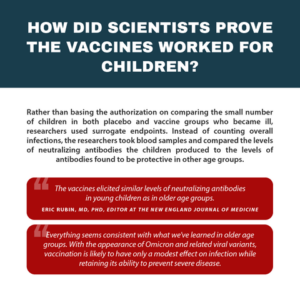 The trials for young children were smaller than those for adults. Rather than basing the authorization on comparing the small number of children in both placebo and vaccine groups who became ill, researchers used surrogate endpoints. Instead of counting overall infections, the researchers took blood samples and compared the levels of neutralizing antibodies the children produced to the levels of antibodies found to be protective in other age groups. “The vaccines elicited similar levels of neutralizing antibodies in young children as in older age groups.” Eric Rubin, MD, PhD, an editor at the New England Journal of Medicine, says in a recorded interview, adding, “Everything seems consistent with what we’ve learned in older age groups. With the appearance of Omicron and related viral variants, vaccination is likely to have only a modest effect on infection while retaining its ability to prevent severe disease.”
The trials for young children were smaller than those for adults. Rather than basing the authorization on comparing the small number of children in both placebo and vaccine groups who became ill, researchers used surrogate endpoints. Instead of counting overall infections, the researchers took blood samples and compared the levels of neutralizing antibodies the children produced to the levels of antibodies found to be protective in other age groups. “The vaccines elicited similar levels of neutralizing antibodies in young children as in older age groups.” Eric Rubin, MD, PhD, an editor at the New England Journal of Medicine, says in a recorded interview, adding, “Everything seems consistent with what we’ve learned in older age groups. With the appearance of Omicron and related viral variants, vaccination is likely to have only a modest effect on infection while retaining its ability to prevent severe disease.”
Is One Vaccine More Effective Than the Other?
It’s difficult at the moment to make a direct comparison between the Moderna and Pfizer vaccines. The studies did assess the number of children who were symptomatic and tested positive for the disease. In the Pfizer study, the FDA noted that the numbers were far too small to be conclusive. The researchers estimated Pfizer’s vaccine to be 75.6% effective for children 6 to 23 months old and 82.4% effective for those 2 to 4 years old. Moderna’s trial was larger and found its vaccine to be 50.6% for children 6 to 23 months old and 36.8% effective for those 2 to 5 years old.
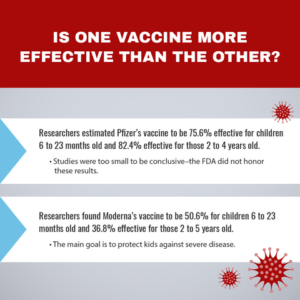
“We’re looking at these vaccines now from Moderna and Pfizer for how effective they are at preventing any symptomatic disease. But keep in mind that—even when you see the rates of those protective efficacy or vaccine efficacy—there’s a higher efficacy protecting kids against severe disease. That’s really one of our main goals. Probably our main goal in vaccinating anyone is to protect against those bad outcomes from COVID-19,” Paul Spearman, MD, director of the division of infectious diseases at Cincinnati Children’s Hospital Medical Center, tells SciLine.
What Is the Difference Between Pfizer’s and Moderna’s Vaccines?
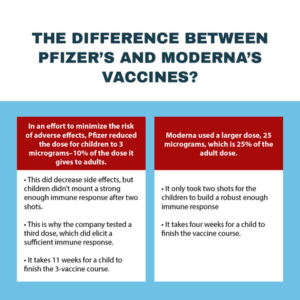
Pfizer and Moderna used distinct strategies to adjust their vaccines for young children. In an effort to minimize the risk of adverse events like fevers and nausea that might prevent parents from bringing their children to get second and third shots, Pfizer reduced the dose to 3 micrograms, 10% of the dose it gives to adults. This decision did seem to lower the frequency of side effects, but it also left the company scrambling because children didn’t mount a strong enough immune response after two shots. That’s why the company extended its trial and administered a third dose. This seems to have paid off, because, after the third vaccine, children had robust neutralizing antibody responses. However, this outcome also means that it takes a full 11 weeks to finish all three shots and another week or two for children to reach the highest level of protection against COVID-19.
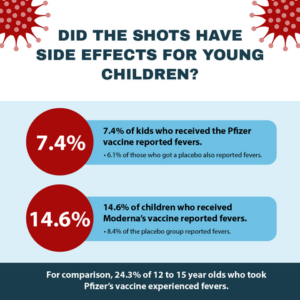
Moderna used a larger dose, 25 micrograms, which is 25% of the adult dose. It only took two shots for the children to build a robust enough immune response, meaning that it only takes four weeks for a child to finish the vaccine course.
Did the Shots Have Side Effects for Young Children?
In terms of side effects, Pfizer’s strategy of administering low doses seems to have paid off. For example, only 7.4% of kids who received the vaccine (and 6.1% of those who got a placebo) reported fevers. On the other hand, 14.6% of children who received Moderna’s vaccine (and 8.4% of the placebo group) reported fevers. For comparison, 24.3% of 12 to 15 year olds who took Pfizer’s vaccine experienced fevers. Other reported side effects for both vaccines were similar to those seen in trials of older patients, including injection-site pain, fatigue, headaches, muscle aches and nausea, but were less frequent in the younger groups than in adults and adolescents.
A positive outcome so far is that scientists have not seen signs of myocarditis, the heart inflammation that has occurred in some adolescent recipients. Adolescents tend to be at higher risk for the condition than younger children, whether or not they’re vaccinated.
If you have questions about the COVID-19 vaccine for your little one, make sure to speak to your pediatrician.


